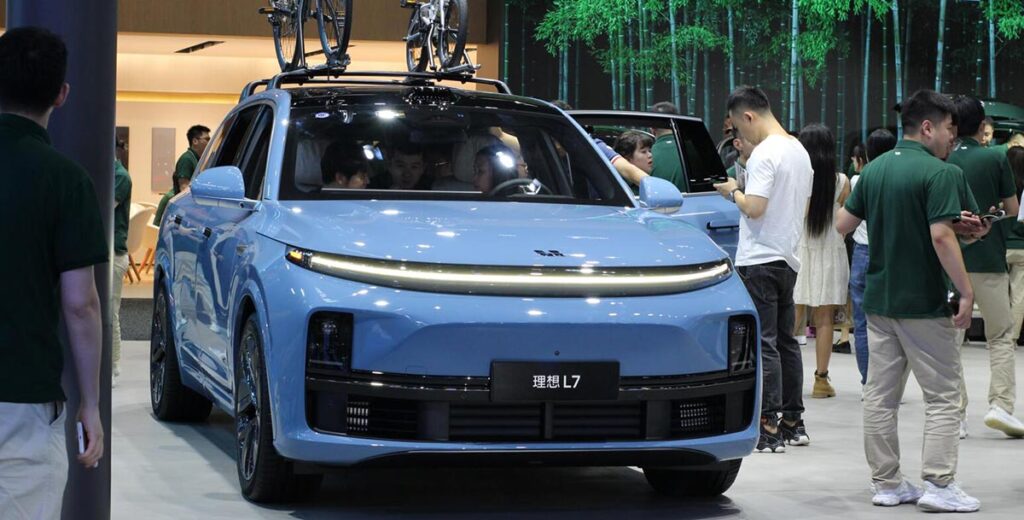Li Auto is aiming to sell at least 400,000 units of its three existing models in 2024, with a new EREV Li L6 selling 30,000 units a month and the Li Mega MPV selling 8,000 units a month. It will launch three new BEV models in the second half of the year.

(Image credit: CnEVPost)
Li Auto’s CEO said earlier this month that the company will challenge annual deliveries of 800,000 units and monthly deliveries of 100,000 units in 2024.
The aggressive target implies a roughly 110 percent increase, considering Li Auto delivered 376,030 vehicles in all of 2023, sparking a lot of discussion. Now, one of the company’s executives has revealed how it will achieve those goals.
Annual sales of 800,000 vehicles is the goal Li Auto is challenging, and none of China’s new car-making forces have yet reached that level, its senior vice president Zou Liangjun said in a January 12 interview with local media, according to The Paper.
China’s annual car sales average more than 20 million units, contributing one-third of the world’s total, so Li Auto has a chance to reach its goal, he said.
Under the 800,000-unit annual sales target, Zou provided a more detailed model-specific target.
Li Auto’s mainstays are the Li L7, Li L8, and Li L9 on sale, which are about to see 2024 model year refreshes so as to remain competitive, said.

“We will work hard to ensure that these three models do not decline in market share. They sold 376,000 units in 2023, and the Li L7, Li L8, and Li L9 should sell at least 400,000 units in 2024,” Zou said.
The three models Li Auto is currently selling are extended-range electric vehicles (EREVs), which are essentially plug-in hybrids. The company plans to launch and begin delivering its first battery electric vehicle (BEV), the Li Mega MPV (Multi-Purpose Vehicle), in March.
On January 11, Li Auto said it would update its L-series models with new configurations, and that 2024 models would be released and deliveries would begin in March.
Zou also said in the interview that there is a serious shortage of BEVs in China with prices above RMB 500,000 yuan ($69,740).
The Li Mega will have to challenge monthly sales of 8,000 units when it goes on sale, Zou said.
Li Auto began pre-sales of the Li Mega on November 17, the first day of the Guangzhou auto show, and hinted that it would be priced between RMB 500,000 yuan and 600,000 yuan.
This will be a big year for Li Auto’s products, with its first sub-RMB 300,000 model, the Li L6, going on sale in April, Zou said.
The market space for models in the RMB 200,000 to RMB 300,000 price range is twice as large as that for models priced above RMB 300,000, Zou noted.
The market is also more competitive, with Tesla‘s (NASDAQ: TSLA) Model Y, for example, selling 40,000-50,000 units a month in China, he said.
The Li L6 aims to challenge monthly sales of 30,000 units, Zou said, adding that Li Auto will launch three BEV models based on the high-voltage platform in the second half of the year.
Zou’s words corroborate an earlier report on the Li L6, but mention a higher target.
On January 5, local media outlet LatePost, citing a source close to Li Auto, reported that the company intends to move up the launch of the Li L6, a five-seat EREV SUV originally scheduled for June, to early April.
The move is to counter competition from Huawei-backed Aito’s new M7, the source said, adding that Li Auto expects sales of the Li L6 to be 20,000 units per month.
In order to achieve the sales target, which is seen as “mission impossible” by outsiders, Zou, a former Huawei executive, brought the management model of the phone business to Li Auto, which manages its product inventory on a day-to-day basis, The Paper’s report said.
Zou believes that the biggest risk to a business is inventory, while the inventory factor of traditional automotive companies is calculated on average on a monthly basis, and many disappeared manufacturing companies were consumed by inventory that drained cash flow and profits, the Paper noted.
Li Auto’s requirement for its teams is that the delivery of a vehicle from the time a customer places a deposit to the time it is delivered must be completed within seven days, according to the report.
The average number of days to ship a vehicle out of the Changzhou factory is 3-4 days, leaving 1-2 days to complete all delivery work, the report noted.
“We have studied and borrowed management lessons from the phone industry, which essentially means making it more efficient,” Zou said.
Li Auto’s number of direct sales stores increases from 288 to 467 in 2023. The company plans to significantly increase the number of sales stores to support volume growth.
To support the 800,000-unit sales target, Li Auto stores will expand to 800 by the end of 2024, averaging one new store a day, Zou said.

($1 = RMB 7.1696)

